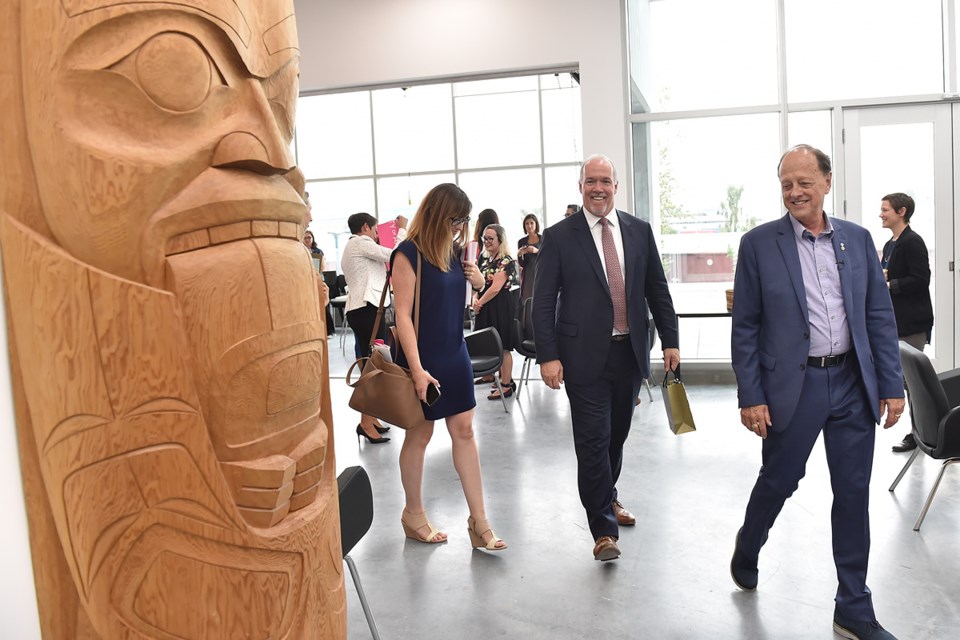The new Emily Carr University of Art + Design officially opened Tuesday without the one facility that its president is well aware is needed to accommodate students in Vancouver: an affordable place to live on campus.
While the focus Tuesday was on celebrating an almost two-decades long pursuit to build a new campus for the longtime arts school formerly on Granville Island, Dr. Ron Burnett acknowledged during a tour of the new building on Great Northern Way that a residence for students is a missing piece of the $122-million project.
In fact, Burnett said, the university is in discussions with three developers about constructing a residence that could accommodate 300 to 500 students. Such housing could take three to five years to build, said Burnett, adding that he wants the rents to be in the $600 to $800 per month range.
He cautioned that price range is in today’s dollars and would likely increase when the residence opens.
“The only deal — certainly under my tenure — that we would agree to would be a deal that actually maintains the rents at a level that [students] could afford,” he said, before discussing his philosophy on the cost of education. “My position has always been that education should be free. But given the circumstances, our fees are — relatively speaking — quite low. We’re among the lowest in the province, and certainly among the lowest in Canada.”
Burnett said the average tuition fee to attend the university for one school year is $4,000. Even with low tuition, he said, some students take five to six years to complete a program because they have to work to fund their education. The university has about 2,000 full-time students and 3,000 who are part-time.
“We’ve tried to keep things under control and we’ve tried to help our students as much as we can,” he said. “I think this community is so sensitive to that [affordability] challenge, and I’m really concerned about it.”
Alia Hijaab Ebayed, the chairperson of the university’s students’ union, welcomed the news that a residence could soon be built on campus. Hijaab Ebayed said affordability is a constant challenge for students who want to attend a post-secondary school that happens to be in one of the world’s most expensive cities.
Hijaab Ebayed, who begins her fourth year of studies in animation this fall, said she shares a small suite in an East Side house for $1,400 a month. She said she works three jobs, including her work with the student union and in a café, but will soon decrease her workload to make time for school.
“Many students have to have multiple jobs just to get by,” she said. “It’s definitely a hindrance — it’s hard for a lot of students to do that, especially without help from their families. People who are able to get loans or get help from their families can get by, but then people with loans have to worry about debt. It’s a bit of endless cycle.”
Added Hijaab Ebayed: “It’s hard, it’s super hard.”
When Hijaab Ebayed finishes school, she said she will likely have to move out of Vancouver to a neighbouring suburb that is more affordable. Leaving Vancouver because of housing costs is a reality for many graduates, she said.
Despite the affordability crunch in Vancouver, Burnett said the university has not seen a decline in applications for both the graduate and undergraduate level programs. In fact, he added, there are more applications than spots available.
At Tuesday’s opening, Burnett provided Premier John Horgan with a tour of the building. The provincial government contributed more than $100 million to the project, with another $22 million coming from donors including realtor Bob Rennie and Lululemon founder Chip Wilson. The student union donated $325,000.
The first discussion of a new campus for Emily Carr occurred in 2001 when Burnett and then-University of B.C. president Martha Piper talked about bringing Emily Carr, UBC, Simon Fraser University and the B.C. Institute of Technology together on the 18.3 acres of land on Great Northern Way, near Main Street.
That discussion was triggered by Finning International donating the land to the consortium of schools. Burnett said the former buildings on Granville Island that used to house the school are owned by the Canadian Mortgage and Housing Corporation.
No decision has been made on the buildings’ future, he added.
@Howellings



